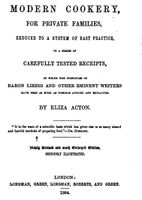Advertisement
Stewing
By Eliza Acton
Published 1845
This very wholesome, convenient, and economical mode of cookery is by no means so well understood nor profited by in England as on the continent, where its advantages are fully appreciated. So very small a quantity of fuel is necessary to sustain the gentle degree of ebullition which it requires, that this alone would recommend it to the careful housekeeper; but if the process be skilfully conducted, meat softly stoved or stewed, in close-shutting, or luted‡ vessels, is in every respect equal, if not superior, to that which is roasted; but it must be simmered only, and in the gentlest possible manner, or, instead of being tender, nutritious, and highly palatable, it will be dry, hard, and indigestible. The common cooking stoves in this country, as they have hitherto been constructed, have rendered the exact regulation of heat which stewing requires rather difficult; and the smoke and blaze of a large coal fire are very unfavourable to many other modes of cookery as well. The French have generally the advantage of the embers and ashes of the wood which is their ordinary fuel; and they have always, in addition, a stove of this construction, in which charcoal or braise (for explanation of this word, see remarks on preserving.) only is burned; and upon which their stewpans can, when there is occasion, be left uncovered, without the danger of their contents being spoiled, which there generally is with us. It is true, that of late great improvements have been made in our own stoves: and the hot plates, or hearths with which the kitchens of good houses are always furnished, are admirably adapted to the simmering system; but when the cook has not the convenience of one, the stewpans must be placed on trivets high above the fire, and be constantly watched, and moved, as occasion may require, nearer to, or further from the flame.

